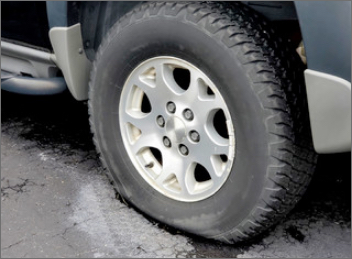
06 Oct Talking Tires with a Friend…
You are correct on all counts. Yes, I’m passionate when it comes to tires and there and of course there is a story behind it and yes, this is good article that hits on several important factors. However, it misses on one (1) very important factor that the tire manufacturers never want you to know and it certainly is missing from most, if not all tire articles.
Tire Compounds
Compounding coupled with tread design are two (2) very important factors when it comes to selecting and applying tires to a specific application and both have improved immensely in the past few years. Additionally, manufactures have attempted to partner to a much greater degree than in the past where it was primarily a customer/vendor relationship. They attempt to educate the customer better in hopes the education will assist in the performance of their respective product in their respective application. However, they still refrain from educating the customer on this one (1) kernel of information that would tip the scales. And from my perspective it all leads to poor management and leadership, which falls into the casing of integrity, trust and respect. (Pun intended.)
Tire pressure monitoring and tire inflation systems didn’t pop on the market because some engineer got a wild hair up his ass. No, they came from where most things come from and that is necessity is the mother of invention, and they were invented for several reasons.
One (1) of the topics the article hits on is compounding and it is the compounding that provides traction while simultaneously attempting having minimal rolling resistance for optimal fuel efficiency. That is one tough challenge to meet and how it accomplishes this tire must breath in order to adapt to atmospheric conditions.
Perfectly Good Tires Lose Air!
As such, that kernel of information the manufacturers don’t won’t you to know is the perfectly good tires loose air. If the compound was as such that it didn’t lose air you sure as hell wouldn’t want to ride on them must less take a curve on a rainy night in Georgia. Have you ever noticed that some car breaks down and they park it somewhere and it sits there for several years before the tires go down. That is due the only change in temperature of the tires being ambient atmospheric conditions because they are not getting hot and cold from use and the more they are used the more air they will lose. Commercial truck tires will lose two (2) to four (4) psi per month and car tires will lose 1 to 2 psi. if used regularly
The next factor playing out in this mystery is that oils have also improved dramatically over the last ten (10) years. Just as passenger cars and light trucks have progressed from the staple of 3000 miles to 7500 miles and commercial applications have gone to as much as 50,000 between drain and fill. Personally 50k is frigging stretching it with some of the clowns that are out there operating the equipment. As such, a commercial truck tire has the potential of loosing 20 to 25 psi between PMI’s. Somewhere around the loss of 10 psi you start damaging the tire and casing depending of course on application as well as atmospheric and environmental conditions. The other thing that amazes me that many have knew for years that oil should be changed at three (3) months or three thousand miles whichever comes first. Ask one mechanic why three (3) months and you will get the deer in the headlights look like you’ve never seen, but I know you know the answer to this this so I won’t bore you.
Tire Monitoring Systems
Wah-lah, tire monitoring and tire pressure inflation system appear in order to attempt to solve this problem and capture this opportunity. The one system out there with the greatest potential from my perspective is the one that increases as well as decreases the air pressure as required by conditions. That system once the bugs are worked out of it coupled with these improved compounds and applying the correct thread design to the application I would think without any road hazards the casing would last ten (10) to (12) years.
Integrity, Trust, Respect, and ultimately Leadership.
My passion for tires developed during the 90’s when the quality movement had put promotions to a stretching halt and this guy said he couldn’t recommend me for a promotion because he I didn’t know enough about tires. Well, I delved into it and uncovered all the things the manufactures were and were not telling us. This, from my perspective tittered on an deep underlying integrity issue, which naturally escalates to respect, trust and of course leadership. From my perspective, if the tire manufacturers would be upfront and explain to God and industry that their perfectly good tires lose air and why, they would gain the respect they are so desperately seeking and along with it would be recognized for their integrity. XYZ tires could do just this and in turn capture some of the OEM market share they are attempting to gain.
Now for the most important portion of this response. I’m honored that we have started this regular back and forth dialog and you know how I like to speak and write about these problems / opportunities facing the industry. However, that is nothing compared to hearing that you are recovering from surgery and you are back on the mend.
Be well my friend!
p.s. If you see a car or truck with low tires you can bet it needs an oil change.
For more articles on a variety of aspects fleet maintenance and leadership please see https://mcbconsulting.com/blog/
For more inspirational quotes and percepts please see https://www.passiton.com




